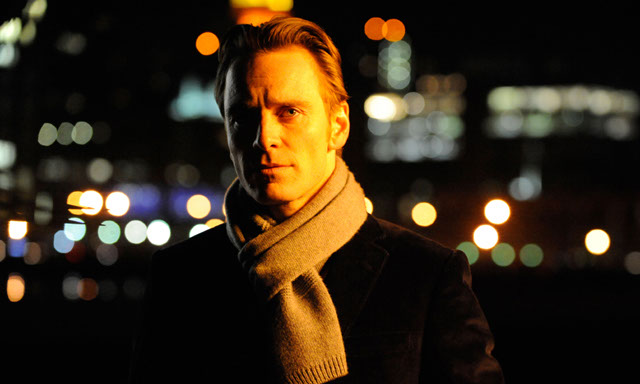
Film: Shame
Country: UK
Year of Release: 2011
Director: Steve McQueen
Screenwriters: Steve McQueen, Abi Morgan
Starring: Michael Fassbender, Carey Mulligan, Nicole Beharie
♥♥♥♥
If you’re going to be a sex addict, it certainly helps to look like Michael Fassbender. And it doubly helps to be as generously endowed as the increasingly famous actor, an endowment of such substance that it has dominated all discussion of this film about the downward spiral of a sex addict. Except that, despite much sex and much downward spiralling, Shame isn’t really a film about sex addiction per se, and despite all the hype around the film and Fassbender’s, er, substantial talent, it doesn’t pretend to be.
To be sure, Brandon, the New York ad agency employee who Fassbender plays, is certainly fond of more than the occasional shag (including numerous bouts of self-service) and sex is clearly his key mode of expression, but there’s a whole lot more to Shame than that. Sex and sexuality is simply the surface layer of this remarkable film.
Similarly, much has been written about the film’s raw and graphic nature, but it’s an emotional rather than a sexual rawness that defines Shame. And, apart from a few shots in which Brandon wanders around naked, the film is not exceptionally visually explicit, given that cinema has generally got a whole lot less shy about sex and nudity in the last decade. Compared to a film like Shortbus – which featured very graphic real sex with real erections (but was decidedly unpornographic in its sentiments) – Shame is relatively restrained. The real explicitness is emotional – or rather I should unemotional – and the result is far more hardcore than most visually explicit films about sex.
More a portrait than a narrative, the film shows Brandon moving around New York and its subways, and having sex at every opportunity – which although pretty often, is still not often as he would like. And when he meets Marianne (Nicole Beharie), someone with whom he feels a real emotional and intellectual attraction, he…well, I’m not going to ruin the storyline, minimal as it.
Despite its array of bodies, appendages and implicit bodily fluids, Shame is really a movie about interiority. The irony here is that while Brandon is incapable of letting anyone into his life, let alone his heart or mind, he is equally inaccessible to the film and its audience. And also, it seems, to himself. It’s not that Brandon doesn’t want to love. He simply doesn’t know how. It’s almost like he can’t quite remember. Or perhaps he can, but the pain is too great. That said, I should also point out that the film doesn’t at any point make moral judgements about sex, or reduce sex and love to the simple binaries of, say, American elections.
On the other hand, for Brandon’s sister (Carey Mulligan), who has recently moved in with him, love comes too easily and she gives her heart away as quickly as his brother dispenses with his body. But as the film progresses, it becomes apparent that Sissy’s desperate need to reach out to someone, to anyone, is precisely the thing that prevents Brandon from reaching out beyond the perimeter of his own body. What that thing is exactly, the film never tells us, and Shame is in many ways a film about a shared history to which we are not privy. It is also a deeply layered film about the social construction of sexuality, morality and guilt.
That it all works so well as a film is testament to a remarkable grasp of pacing and immaculately controlled direction from Steve McQueen. But it couldn’t have happened without Michael Fassbender. Seldom has lack of emotion been revealed with such depth. We get a sense of a man that literally cannot see into himself, even as he can see the workings of the world with a dismissive ease. Fassbender’s classically beautiful face is a broken cipher filled with conflicting streams of sadness and desire gradually merging into each other. That’s a description of his orgasm in Shame as he’s having sex with two women. It’s the film’s money shot, and we see only his face.
So sorry to tell you this folks, but this much heralded erotic smut-fest is actual a slow and almost painfully meditative work of art. And when I say that, I’m not being hyperbolic. Shame is unashamedly cinema as fine art – director Steve McQueen first made his name as a visual artist – and it’s fine art waaaay before it’s entertainment. Which doesn’t mean that the film doesn’t play like a thriller or remain thoroughly gripping for all of its 101 minutes. Fine art can do that kind of thing, regardless of whether it’s still or moving. But those expecting a more brutal variation on Californication will be utterly disappointed. Those expecting a beautifully stylised variation on The Outsider, greyly rendered in the medium of existential sexuality, might be slightly less so.
© PETER MACHEN 2017